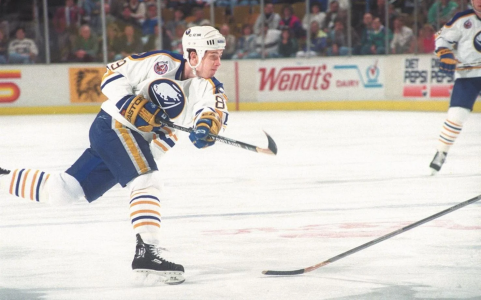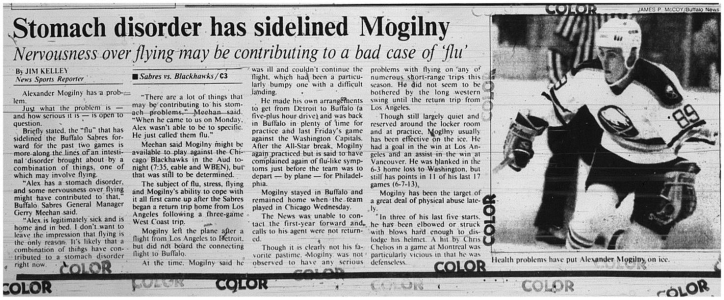
Inside the NHL: Enigmatic Alexander Mogilny finally getting his just reward from Hall of Fame
Mogilny is finally getting his well-deserved induction into the Hockey Hall of Fame on Monday night after a 16-year wait but, true to his reclusive nature, isn't attending any of the weekend festivities in Toronto. He's simply accepting via video.
Good for Alexander Mogilny. A remarkable career in hockey and really a remarkable life in the sport, as a whole.
Mogilny is finally getting his well-deserved induction into the Hockey Hall of Fame on Monday night after a 16-year wait but, true to his reclusive nature, isn’t attending any of the weekend festivities in Toronto. He is simply accepting via video.
Mogilny, 56, is a club president in the KHL in Russia. He was often an enigma as a player, and has become mostly persona non grata when it comes to North America later in life. It is pretty easy to find people around here who will shake their head at the mere mention of his name.
The Sabres somehow got him to attend his induction into the team’s hall of fame in 2011, but he didn’t speak to the media that night, like everyone does, and the skinny is he didn’t have a lot of words for anybody, really. And he didn’t acknowledge the Greater Buffalo Sports Hall of Fame when it chose to honor him in 2016.

Former Sabres winger Alexander Mogilny scored a franchise-record 76 goals in the 1992-93 season.
Buffalo News file photo
Inducting Mogilny this year was actually a prudent decision by the hockey hall. It was obvious he should have been an inductee years ago. He had 473 goals and 1,032 points in 990 games, including that iconic 76-goal season with the Sabres in 1992-93. A 55-goal season in Vancouver. A Stanley Cup in New Jersey. Gold medals in the Olympics and World Championships.
So, what took so long?
Selection committees passed him over multiple times over the years, it was said they knew he would not attend ceremonies. The Hall wasn’t accepting such a snub of hockey’s highest honor.
But one problem Mogilny’s absence has created is that he started to dominate the narrative of the selections, both in advance of the June announcement of the newest class of inductees and in the wake of their selections.
There has been this constant drumbeat about why Mogilny wasn’t selected, if he was better than this guy or that guy who was chosen and how can the selection committee have possibly overlooked Mogilny in favor of that guy.
It seems the Hall finally said, “No mas,” and gave Mogilny his rightful induction so that starting next year, you won’t hear about him anymore. Former Sabres general manager Gerry Meehan, who engineered Mogilny’s defection at the 1989 World Championships in Stockholm, has said for years Mogilny should be getting his due. He is thrilled the day is finally here.
“I really and truly believed it was inevitable,” Meehan told me last week. “He’s the guy that triggered the whole event of Russian inclusion in the NHL. I have a perspective that’s different than most people’s, and very few people really understand the complexity of what we did, what he did and all the risks he took. I think that was inevitably going to be recognized as the person whose decisions and courage triggered one of the most important additions of high-level skill to the NHL, ever.”
Indeed, the Sabres took a chance by drafting Mogilny in the fifth round in 1988, and his success here was truly a team effort. Longtime scouting director Rudy Migay was among those who advocated for the pick, even though the team had no idea whether it could get Mogilny out of the Soviet Union.
Lives were risked in the spy-novel tale of evading the KGB and getting him out of Stockholm. Former Sabres center Don Luce, then the team’s director of player personnel, spent several hours aimlessly driving Mogilny around the Swedish countryside while immigration paperwork was being finalized to get him into the United States.
He was in the opening night lineup that October and thrilled the Memorial Auditorium crowd by scoring 20 seconds into his first game against the Quebec Nordiques. A 15-goal rookie season was followed by campaigns of 30 and 39 goals, which brought us to ’92-93. Mogilny exploded for 76 goals and 127 points while playing with Pat LaFontaine, who had 53 goals and 148 points.
Given today’s emphasis on defense and the quality of goaltending, it seems inconceivable that Mogilny’s franchise record for goals and LaFontaine’s marks for assists (95) and points will ever be approached.
“The acquisition of Pat LaFontaine had a huge impact on all that, but you can’t ignore the importance of other players, as well,” Meehan said. “Such a unique team. Dale Hawerchuk (who had 16 goals and 80 assists) made a huge contribution in his ability to be the secondary scorer, extraordinarily so. We all know he was our quiet leader that year. He was the ultimate pro.
“We just had a very dynamic offensive team, and Pat said he’s never played with a player who can play with such high level skill in every area and never get caught unready for a pass or a shot or a reaction.”
An unmatched skill set
It was the speed of Mogilny that left observers wowed.“A remarkably talented guy in terms of his ability to explode,” Meehan said. “We could never find another player that exploded off the mark with speed and dexterity and control like Alex Mogilny. It didn’t exist in the league. Pat LaFontaine was the ideal partner for a guy like Alex, who was kind of a freelancer.”
In a first-person story written last week for NHL.com, LaFontaine recounted a practice early in the ’92-93 season when he asked Mogilny why he didn’t shoot more.
“I said, “Alex, I’m going to do my best to keep up with you, but if we practice the give and go and I get a sixth sense of where you’re going to be and you start shooting the puck more, I’ll guarantee you’ll score 50 goals this year,” LaFontaine wrote. “He lit up. He just lit up at the thought of 50 goals. I knew that excited him.
“I told him he had to trust the process, to get me the puck and I will look for him on a give and go. Alex skated away after our conversation and I said to (trainer Jim Pizzutelli), ‘’Pizza,’ if he does this, I think he can score 70. I’ll bet you he’ll score 70.
“ ‘Pizza’ laughed. He said, ‘No way. It’ll never happen.’ Alex bought in. He started shooting the puck. We worked on the give and go. We got it down pat.”
The ’92-93 Sabres under coach John Muckler are one of the great near-miss stories in franchise history. After sweeping Boston in the first round of the playoff on Brad May’s long-celebrated overtime goal, the Sabres got swept by Montreal in four straight 4-3 decisions, the last three in overtime. And neither Mogilny nor LaFontaine finished the series due to injury.
“I believe we would have beaten Montreal in that series if they both been healthy. I totally believe it,” Meehan said. “I’ve talked to players on that team at reunions, and they feel the same way. They think that team was extremely close to a Stanley Cup champion. That team had all the ingredients. They had checkers, they had character and toughness and that speed. Tremendous offense and goaltending.”
Indeed, the ’92-93 Sabres now have six Hall of Famers, with Mogilny’s inclusion allowing him to join LaFontaine, Hawerchuk, Dave Andreychuk, Dominik Hasek and Grant Fuhr.
“Still to this day, blue line to blue line, I’ve never seen anybody quicker,” LaFontaine wrote. “His first four strides, it was like Mach 1, Mach 2. He was like a rocket ship. Blue line to blue line, he was the fastest I’ve ever seen.”
Was Mogilny really afraid to fly?
Something I’ve always wanted to ask Meehan but never did until last week: What was up with Mogilny in the early ’90s when he was getting driven to road games? Was he really afraid to fly, or did all the rumors that he wanted to go somewhere else have some truth to them?Meehan chuckled before he answered.
“Here’s what I’ll say to that: The media speculated that there were other things going on,” Meehan said. “My role as a general manager was not to find out whether or not he was really afraid to fly, but to make sure he got to the game. And so I rented him a limousine, and he drove all over the country getting to games. And I think if anything will cure a fear of flying, that will.”

A 1990 story in The Buffalo News by Hockey Hall of Fame writer Jim Kelley described Alexander Mogilny's "stomach disorder" that may have been exacerbated by a fear of flying.
Rangers an off-Broadway show
The New York Post chided the Rangers as the “biggest flop on Broadway” last week, and the tabloid titan isn’t kidding. The Blueshirts fell to 0-5-1 in Madison Square Garden − and got shut out for the fourth time in six home games with a 3-0 loss to the Hurricanes that got them booed off the ice. They’ve scored six goals at home in the six games, with five of them during an Oct. 20 loss to San Jose, and the other coming against Minnesota.That means they don’t have a single goal at home against Eastern teams, losing the three games by a combined 7-0 count heading into Saturday night’s matchup against the New York Islanders.
At home overall, the Rangers are the only team in the league without a win, and have been outscored 18-6. But after Friday’s 4-1 win in Detroit, they have the league’s best record away from home at 7-1-1 and the best road goal differential at plus-12 (29-17).
